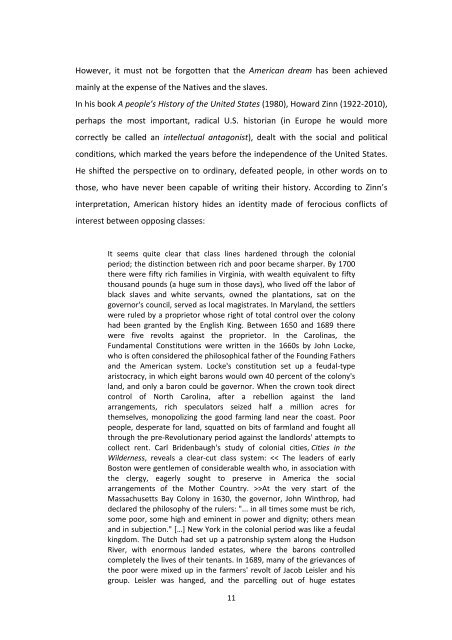building the american landscape - Univerza v Novi Gorici
building the american landscape - Univerza v Novi Gorici
building the american landscape - Univerza v Novi Gorici
Create successful ePaper yourself
Turn your PDF publications into a flip-book with our unique Google optimized e-Paper software.
However, it must not be forgotten that <strong>the</strong> American dream has been achieved<br />
mainly at <strong>the</strong> expense of <strong>the</strong> Natives and <strong>the</strong> slaves.<br />
In his book A people’s History of <strong>the</strong> United States (1980), Howard Zinn (1922‐2010),<br />
perhaps <strong>the</strong> most important, radical U.S. historian (in Europe he would more<br />
correctly be called an intellectual antagonist), dealt with <strong>the</strong> social and political<br />
conditions, which marked <strong>the</strong> years before <strong>the</strong> independence of <strong>the</strong> United States.<br />
He shifted <strong>the</strong> perspective on to ordinary, defeated people, in o<strong>the</strong>r words on to<br />
those, who have never been capable of writing <strong>the</strong>ir history. According to Zinn’s<br />
interpretation, American history hides an identity made of ferocious conflicts of<br />
interest between opposing classes:<br />
It seems quite clear that class lines hardened through <strong>the</strong> colonial<br />
period; <strong>the</strong> distinction between rich and poor became sharper. By 1700<br />
<strong>the</strong>re were fifty rich families in Virginia, with wealth equivalent to fifty<br />
thousand pounds (a huge sum in those days), who lived off <strong>the</strong> labor of<br />
black slaves and white servants, owned <strong>the</strong> plantations, sat on <strong>the</strong><br />
governor's council, served as local magistrates. In Maryland, <strong>the</strong> settlers<br />
were ruled by a proprietor whose right of total control over <strong>the</strong> colony<br />
had been granted by <strong>the</strong> English King. Between 1650 and 1689 <strong>the</strong>re<br />
were five revolts against <strong>the</strong> proprietor. In <strong>the</strong> Carolinas, <strong>the</strong><br />
Fundamental Constitutions were written in <strong>the</strong> 1660s by John Locke,<br />
who is often considered <strong>the</strong> philosophical fa<strong>the</strong>r of <strong>the</strong> Founding Fa<strong>the</strong>rs<br />
and <strong>the</strong> American system. Locke's constitution set up a feudal‐type<br />
aristocracy, in which eight barons would own 40 percent of <strong>the</strong> colony's<br />
land, and only a baron could be governor. When <strong>the</strong> crown took direct<br />
control of North Carolina, after a rebellion against <strong>the</strong> land<br />
arrangements, rich speculators seized half a million acres for<br />
<strong>the</strong>mselves, monopolizing <strong>the</strong> good farming land near <strong>the</strong> coast. Poor<br />
people, desperate for land, squatted on bits of farmland and fought all<br />
through <strong>the</strong> pre‐Revolutionary period against <strong>the</strong> landlords' attempts to<br />
collect rent. Carl Bridenbaugh's study of colonial cities, Cities in <strong>the</strong><br />
Wilderness, reveals a clear‐cut class system: >At <strong>the</strong> very start of <strong>the</strong><br />
Massachusetts Bay Colony in 1630, <strong>the</strong> governor, John Winthrop, had<br />
declared <strong>the</strong> philosophy of <strong>the</strong> rulers: "... in all times some must be rich,<br />
some poor, some high and eminent in power and dignity; o<strong>the</strong>rs mean<br />
and in subjection." […] New York in <strong>the</strong> colonial period was like a feudal<br />
kingdom. The Dutch had set up a patronship system along <strong>the</strong> Hudson<br />
River, with enormous landed estates, where <strong>the</strong> barons controlled<br />
completely <strong>the</strong> lives of <strong>the</strong>ir tenants. In 1689, many of <strong>the</strong> grievances of<br />
<strong>the</strong> poor were mixed up in <strong>the</strong> farmers' revolt of Jacob Leisler and his<br />
group. Leisler was hanged, and <strong>the</strong> parcelling out of huge estates<br />
11
















